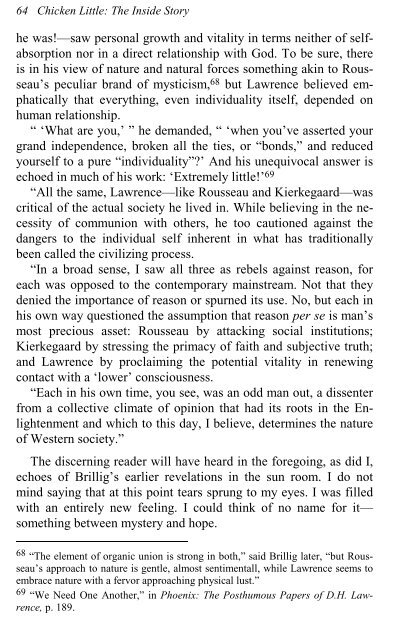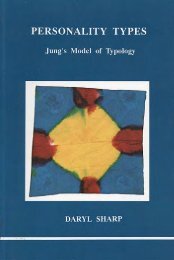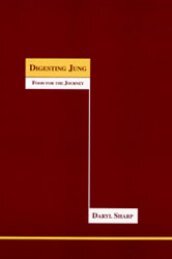Chicken Little: The Inside Story (A Jungian ... - Inner City Books
Chicken Little: The Inside Story (A Jungian ... - Inner City Books
Chicken Little: The Inside Story (A Jungian ... - Inner City Books
You also want an ePaper? Increase the reach of your titles
YUMPU automatically turns print PDFs into web optimized ePapers that Google loves.
64 <strong>Chicken</strong> <strong>Little</strong>: <strong>The</strong> <strong>Inside</strong> <strong>Story</strong><br />
he was!—saw personal growth and vitality in terms neither of selfabsorption<br />
nor in a direct relationship with God. To be sure, there<br />
is in his view of nature and natural forces something akin to Rousseau’s<br />
peculiar brand of mysticism, 68 but Lawrence believed emphatically<br />
that everything, even individuality itself, depended on<br />
human relationship.<br />
“ ‘What are you,’ ” he demanded, “ ‘when you’ve asserted your<br />
grand independence, broken all the ties, or “bonds,” and reduced<br />
yourself to a pure “individuality”?’ And his unequivocal answer is<br />
echoed in much of his work: ‘Extremely little!’ 69<br />
“All the same, Lawrence—like Rousseau and Kierkegaard—was<br />
critical of the actual society he lived in. While believing in the necessity<br />
of communion with others, he too cautioned against the<br />
dangers to the individual self inherent in what has traditionally<br />
been called the civilizing process.<br />
“In a broad sense, I saw all three as rebels against reason, for<br />
each was opposed to the contemporary mainstream. Not that they<br />
denied the importance of reason or spurned its use. No, but each in<br />
his own way questioned the assumption that reason per se is man’s<br />
most precious asset: Rousseau by attacking social institutions;<br />
Kierkegaard by stressing the primacy of faith and subjective truth;<br />
and Lawrence by proclaiming the potential vitality in renewing<br />
contact with a ‘lower’ consciousness.<br />
“Each in his own time, you see, was an odd man out, a dissenter<br />
from a collective climate of opinion that had its roots in the Enlightenment<br />
and which to this day, I believe, determines the nature<br />
of Western society.”<br />
<strong>The</strong> discerning reader will have heard in the foregoing, as did I,<br />
echoes of Brillig’s earlier revelations in the sun room. I do not<br />
mind saying that at this point tears sprung to my eyes. I was filled<br />
with an entirely new feeling. I could think of no name for it—<br />
something between mystery and hope.<br />
68 “<strong>The</strong> element of organic union is strong in both,” said Brillig later, “but Rousseau’s<br />
approach to nature is gentle, almost sentimentall, while Lawrence seems to<br />
embrace nature with a fervor approaching physical lust.”<br />
69 “We Need One Another,” in Phoenix: <strong>The</strong> Posthumous Papers of D.H. Lawrence,<br />
p. 189.










